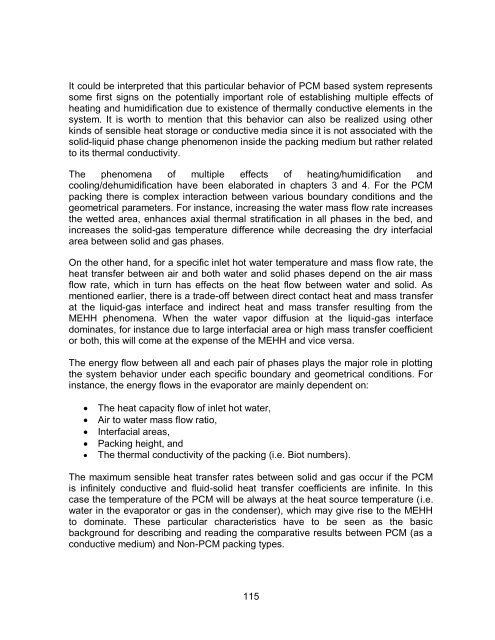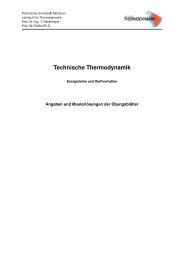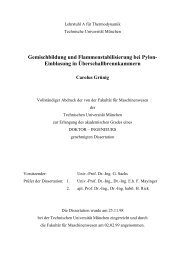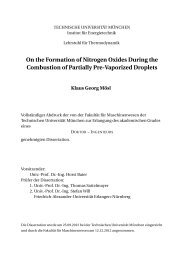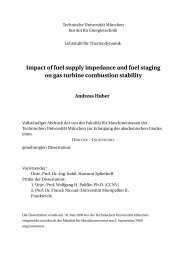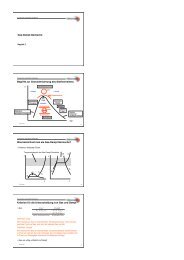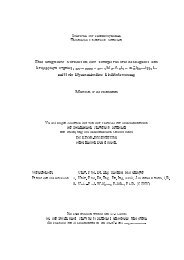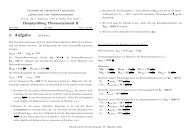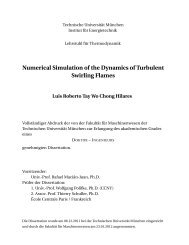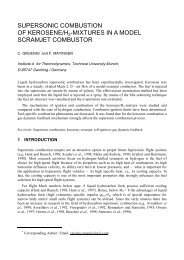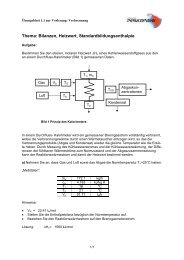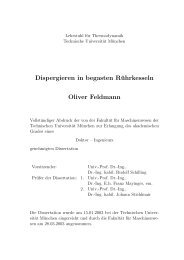Experimental and Numerical Analysis of a PCM-Supported ...
Experimental and Numerical Analysis of a PCM-Supported ...
Experimental and Numerical Analysis of a PCM-Supported ...
You also want an ePaper? Increase the reach of your titles
YUMPU automatically turns print PDFs into web optimized ePapers that Google loves.
It could be interpreted that this particular behavior <strong>of</strong> <strong>PCM</strong> based system represents<br />
some first signs on the potentially important role <strong>of</strong> establishing multiple effects <strong>of</strong><br />
heating <strong>and</strong> humidification due to existence <strong>of</strong> thermally conductive elements in the<br />
system. It is worth to mention that this behavior can also be realized using other<br />
kinds <strong>of</strong> sensible heat storage or conductive media since it is not associated with the<br />
solid-liquid phase change phenomenon inside the packing medium but rather related<br />
to its thermal conductivity.<br />
The phenomena <strong>of</strong> multiple effects <strong>of</strong> heating/humidification <strong>and</strong><br />
cooling/dehumidification have been elaborated in chapters 3 <strong>and</strong> 4. For the <strong>PCM</strong><br />
packing there is complex interaction between various boundary conditions <strong>and</strong> the<br />
geometrical parameters. For instance, increasing the water mass flow rate increases<br />
the wetted area, enhances axial thermal stratification in all phases in the bed, <strong>and</strong><br />
increases the solid-gas temperature difference while decreasing the dry interfacial<br />
area between solid <strong>and</strong> gas phases.<br />
On the other h<strong>and</strong>, for a specific inlet hot water temperature <strong>and</strong> mass flow rate, the<br />
heat transfer between air <strong>and</strong> both water <strong>and</strong> solid phases depend on the air mass<br />
flow rate, which in turn has effects on the heat flow between water <strong>and</strong> solid. As<br />
mentioned earlier, there is a trade-<strong>of</strong>f between direct contact heat <strong>and</strong> mass transfer<br />
at the liquid-gas interface <strong>and</strong> indirect heat <strong>and</strong> mass transfer resulting from the<br />
MEHH phenomena. When the water vapor diffusion at the liquid-gas interface<br />
dominates, for instance due to large interfacial area or high mass transfer coefficient<br />
or both, this will come at the expense <strong>of</strong> the MEHH <strong>and</strong> vice versa.<br />
The energy flow between all <strong>and</strong> each pair <strong>of</strong> phases plays the major role in plotting<br />
the system behavior under each specific boundary <strong>and</strong> geometrical conditions. For<br />
instance, the energy flows in the evaporator are mainly dependent on:<br />
<br />
<br />
<br />
<br />
<br />
The heat capacity flow <strong>of</strong> inlet hot water,<br />
Air to water mass flow ratio,<br />
Interfacial areas,<br />
Packing height, <strong>and</strong><br />
The thermal conductivity <strong>of</strong> the packing (i.e. Biot numbers).<br />
The maximum sensible heat transfer rates between solid <strong>and</strong> gas occur if the <strong>PCM</strong><br />
is infinitely conductive <strong>and</strong> fluid-solid heat transfer coefficients are infinite. In this<br />
case the temperature <strong>of</strong> the <strong>PCM</strong> will be always at the heat source temperature (i.e.<br />
water in the evaporator or gas in the condenser), which may give rise to the MEHH<br />
to dominate. These particular characteristics have to be seen as the basic<br />
background for describing <strong>and</strong> reading the comparative results between <strong>PCM</strong> (as a<br />
conductive medium) <strong>and</strong> Non-<strong>PCM</strong> packing types.<br />
115


